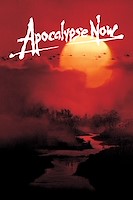Apocalypse Now
Francis Ford Coppola, USA, 1979o
In 1969, in the middle of the Vietnam War, Captain Willard is ordered to liquidate the renegade Colonel Kurtz, who has cut himself off from the American military leadership in the jungle with his personal squad. Willard and his crew fight their way up a river in a patrol boat, with the journey increasingly turning into a hellish trip that reveals the horror and absurdity of war.
The Deer Hunter, Coming Home, Platoon, Born on the 4th of July ... In the years following the end of the Vietnam War (1975), the socially critical New Hollywood repeatedly dealt with this national trauma, which had shaken the American self-image as a democratically legitimized world police force in the struggle with the communist regimes of evil. The strongest of these films remains Francis Ford Coppola's free adaptation of Joseph Conrad's novel Heart of Darkness (1899) from the colonial-era Congo to the Vietnam of 1969. It tells the story of an American officer who receives a secret order to liquidate a US colonel who is holed up in the jungle with his private army. On the journey in a patrol boat, the troop is continually confronted with the abysses of war, unforgettably personified by Robert Duvall as an autocratic lieutenant colonel who has a helicopter attack flown to Wagner's Ride of the Valkyries just so that his boys can surf on the occupied beach. This example shows that Coppola, like most of his contemporaries in the USA, had little interest in the political context of the war - and certainly not in the Vietnamese perspective. Yet, the trip into the spiritual darkness of the GIs remains powerful. Consequently, it ends with a Marlon Brando who, as a warlord finally tracked down, merely crouches in a cave and mumbles apocalyptic mantras.
Andreas Furler

